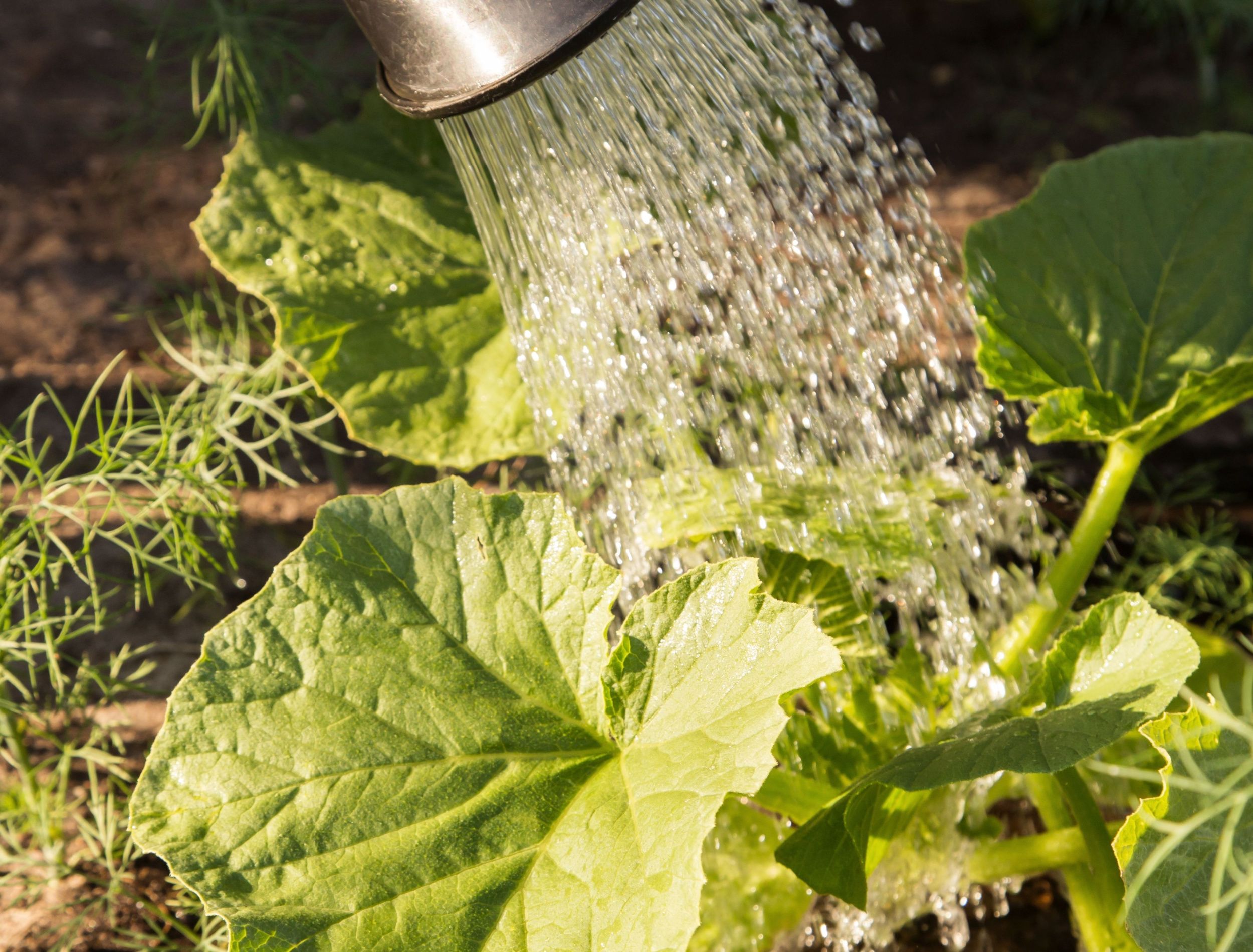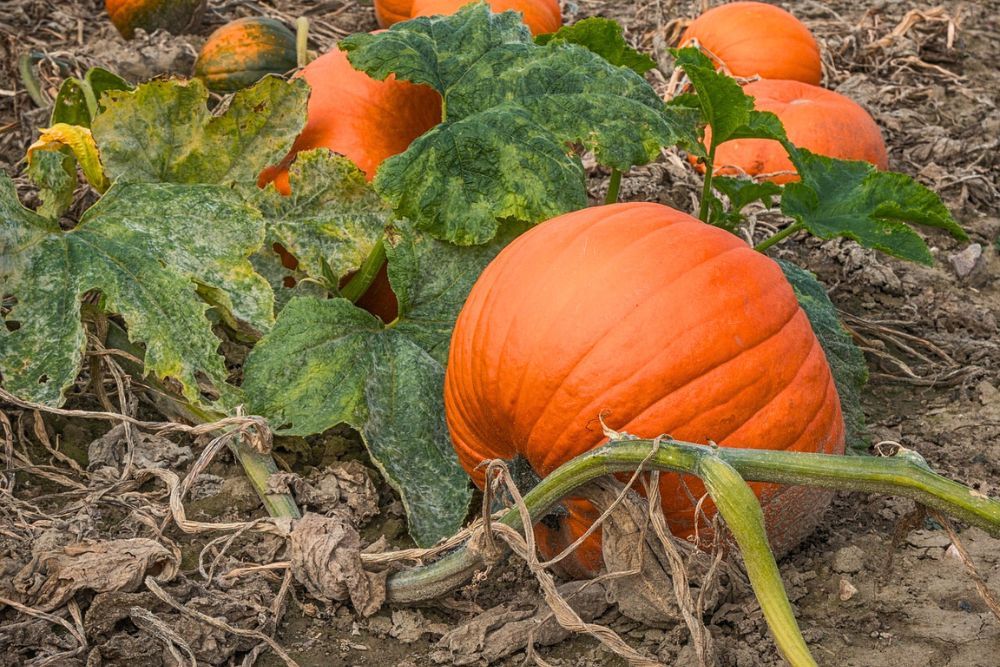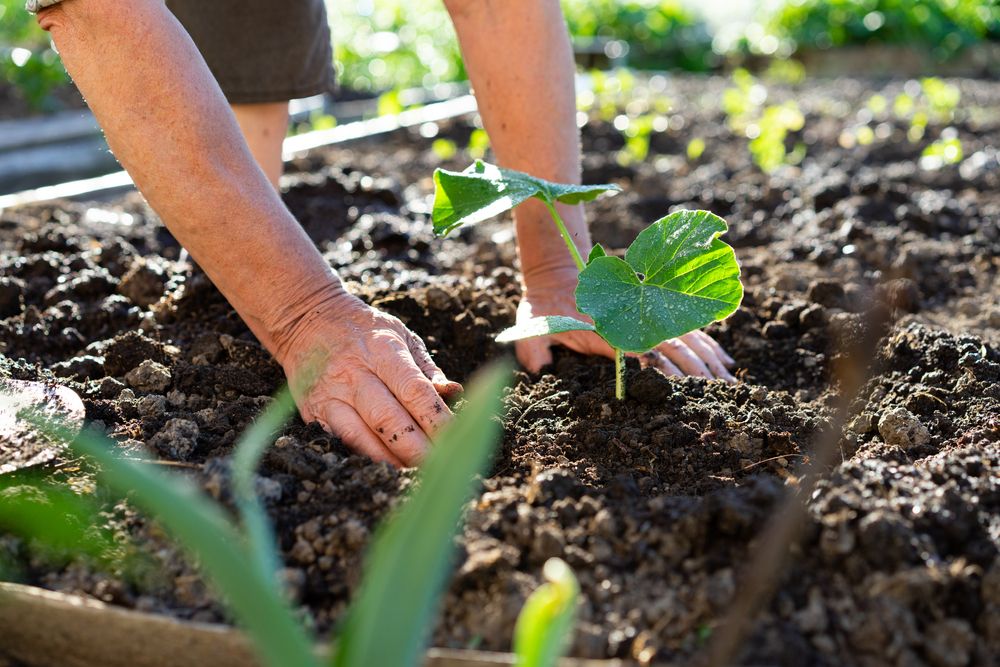Growing the perfect pumpkin requires more than just planting the seeds. To achieve a bountiful pumpkin harvest, providing your pumpkin plants with the right nutrients at the right stages of their growth is essential.
From nitrogen-rich options for seedling growth to phosphorus-heavy formulas for promoting blooms and potassium-rich fertilizers for fruit development, learn everything you need to know to give your pumpkins the nutritional support they need. Discover the top fertilizers that can help you grow big, healthy, and abundant pumpkins!
Understanding Pumpkin Fertilizer Needs
Before you explore the best pumpkin fertilizers, it's important to understand the specific nutrient requirements of pumpkin plants at different stages of their growth. The three primary macronutrients required by pumpkins are nitrogen (N), phosphorus (P), and potassium (K).
These nutrients play crucial roles in various aspects of pumpkin growth, from seedling development to flower production and fruit formation. It's important to note that the nutrient needs of pumpkin plants change as they progress through different growth stages.
Nitrogen-rich fertilizers are ideal in the initial 55 days after seedlings emerge or transplants are planted. As the vines grow and reach a sufficient length, phosphorus-heavy fertilizers promote blooming and fruit set.
Finally, once the pumpkins start growing, potassium-rich fertilizers should be used until harvest.
Liquid vs Granular Fertilizers
When it comes to pumpkin fertilizers, you can use either liquid or granular formulations. Both types of fertilizers provide the necessary nutrients, but they differ in terms of availability and application.
Liquid fertilizers are quickly absorbed by the soil and are readily available to plants. They require less water and are ideal for immediate nutrient delivery. On the other hand, granular fertilizers release nutrients slowly over time, providing a continuous supply of nutrients to the plants. They require watering to activate the granules and are suitable for long-term nutrient release.
Now that you understand pumpkin fertilizer needs and the difference between liquid and granular formulations, here are the top fertilizers that can help you grow healthy and productive pumpkins.
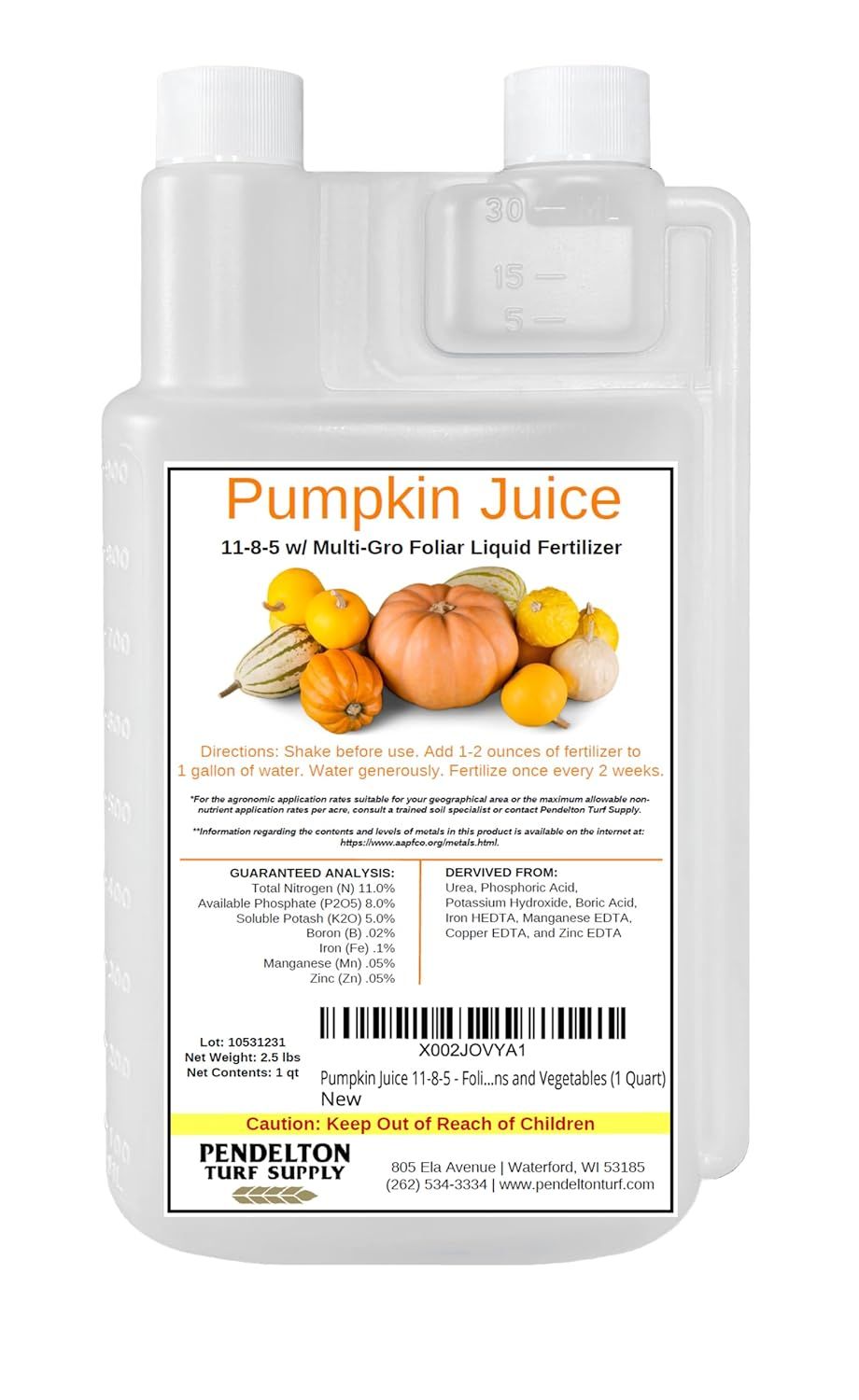
Pumpkin Juice 11-8-5
Pumpkin Juice 11-8-5 is a specialized foliar liquid fertilizer tailored for pumpkins and vegetables, designed to provide all the essential nutrients necessary for robust pumpkin vine growth and abundant pumpkin production.
- Easy for the vines to take up
- Formulated especially for pumpkins
- Water-soluble
- The container has a built-in measuring system
- Expensive initially
- Can promote excessive foliage growth if used after blooms start
- Needs to be mixed at one ounce per gallon of water for young plants to avoid burning them
- Not certified organic
Pumpkin Juice's built-in measuring system sets users apart, offering the convenience of precise and hassle-free application.
For starting pumpkin seeds indoors, mixing one ounce of Pumpkin Juice with a gallon of water is recommended. Once the seedlings are transplanted into the ground, a mixture of two ounces of Pumpkin Juice per gallon of water can be applied.
However, it's crucial to exercise caution when using Pumpkin Juice after the blossoms have appeared, as excessive application can lead to an overgrowth of foliage at the expense of flower and fruit production. Careful and appropriate use of this fertilizer can help you achieve a bountiful pumpkin harvest.
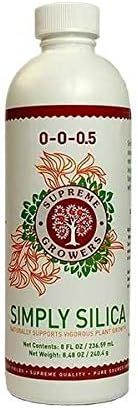
Simply Silica 8oz Concentrate
Simply Silica 8oz Concentrate is a valuable potassium-rich fertilizer to consider for your pumpkin vines, especially after fruit has set.
- The bottle makes 47 gallons of solution
- Easy application
- Supplements potassium in the soil
- Water-soluble
- Does not contain nitrogen or phosphorus
- Needs to be applied every two weeks
It contains potassium silicate, a form of potassium that's readily absorbed by pumpkin vines, delivering immediate benefits. What sets Simply Silica apart is its cost-effectiveness, as an 8oz bottle can produce an impressive 47 gallons of solution when properly diluted.
This water-soluble fertilizer demonstrates noticeable effects in vines within a few days of application, making it an efficient choice for promoting healthy fruit development. It's recommended to apply it every two weeks, mixing at one teaspoon per gallon of water. However, it's crucial to exercise caution and avoid using too much concentrate or applying the solution too frequently, as excessive use can lead to issues like pumpkin splitting, exploding, or premature vine detachment.
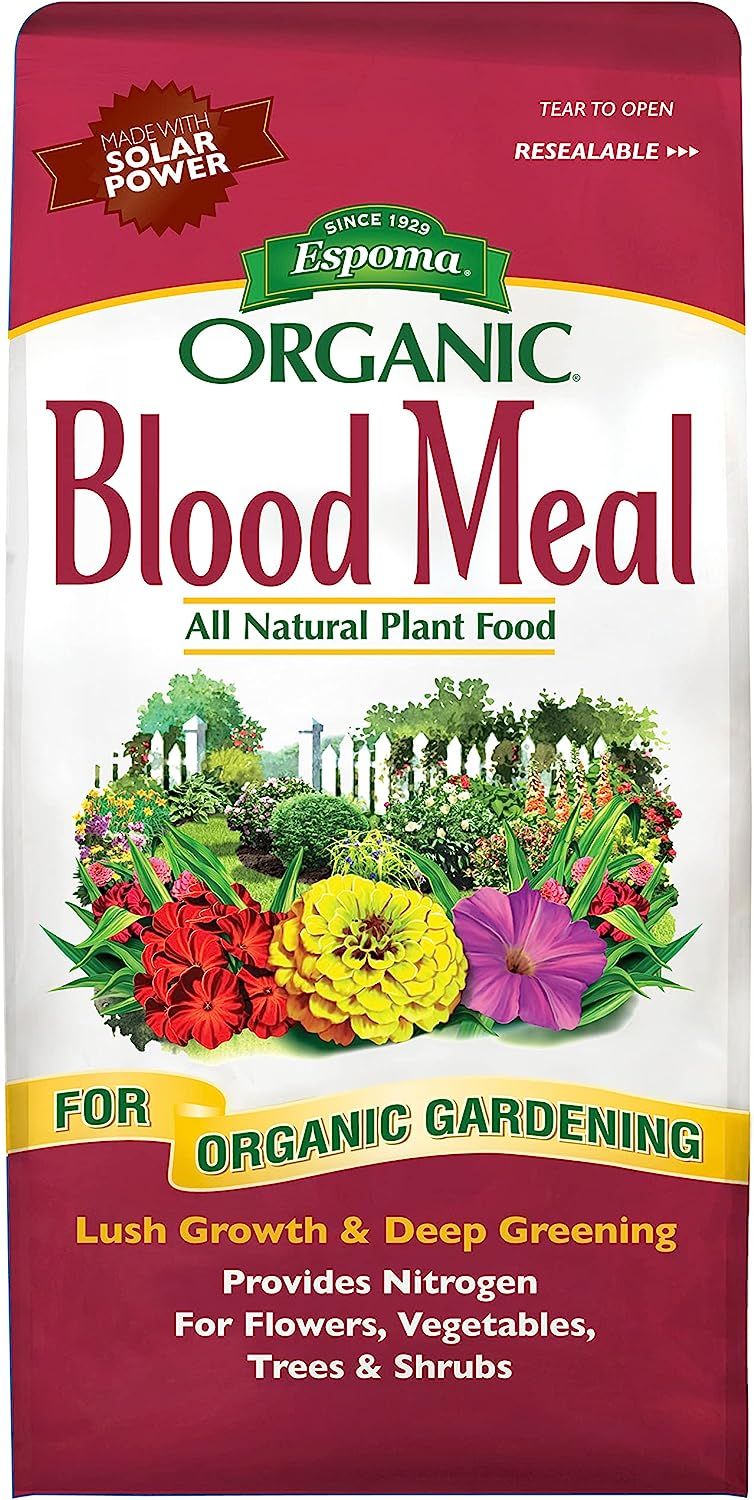
Espoma Blood Meal Granules Organic Plant Food
Granular fertilizers, like Espoma Blood Meal Granules Organic Plant Food, offer an effective method for slow-release nutrient delivery, and this particular product is an excellent choice for promoting pumpkin growth.
- Produces deep green leaves and healthy vines
- Concentrated source of nitrogen
- Organic
- Uses more water than other forms of fertilizer
- Can burn plants if excessive amounts are applied
- Wear waterproof gloves when handling
Blood meal, derived from the cattle industry, serves as a concentrated source of nitrogen and is environmentally friendly. Espoma Blood Meal is organic and contributes to the development of deep green leaves and robust vines.
However, it's crucial to exercise caution when using this product. Following the label instructions carefully is essential to prevent plant burning and excessive vine growth. Additionally, it's worth noting that blood meal can be messy, so it's advisable to stand upwind during application and wear waterproof gloves to avoid staining clothing. With proper care and application, this granular fertilizer can be a valuable asset in cultivating healthy and thriving pumpkin plants.
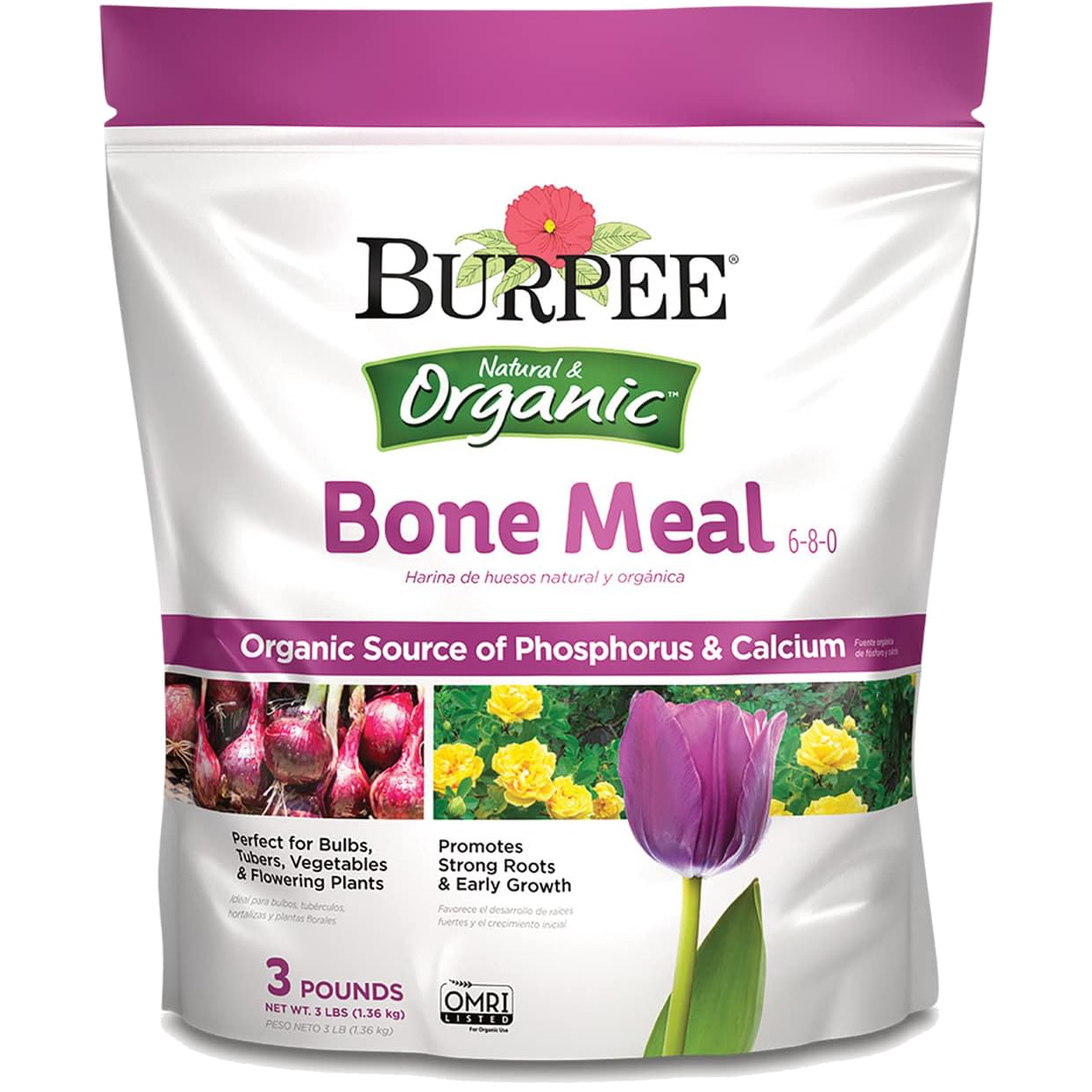
Burpee Bone Meal Fertilizer
Burpee Bone Meal Fertilizer serves as an excellent source of phosphorus for pumpkin plants while also providing some nitrogen.
- Releases nutrients slowly
- Organic
- Contains nitrogen and phosphorus
- Messy, stand upwind when applying
- Wear waterproof gloves when handling
- Does not contain potassium
Derived from the cattle industry, bone meal is a by-product that ensures minimal waste. One notable advantage of Burpee Bone Meal is its slow breakdown, which reduces the frequency of application compared to liquid fertilizers. It contains both nitrogen and phosphorus, making it well-suited for promoting blooms and fruit set in pumpkins.
However, it's essential to be aware that Burpee Bone Meal does not contain potassium, so it should not be used after the pumpkin vines have set fruit. Additionally, bone meal can be messy, so it's advisable to stand upwind during application and wear waterproof gloves to prevent staining clothing. With proper usage and timing, this fertilizer can be a valuable addition to your pumpkin growing regimen.
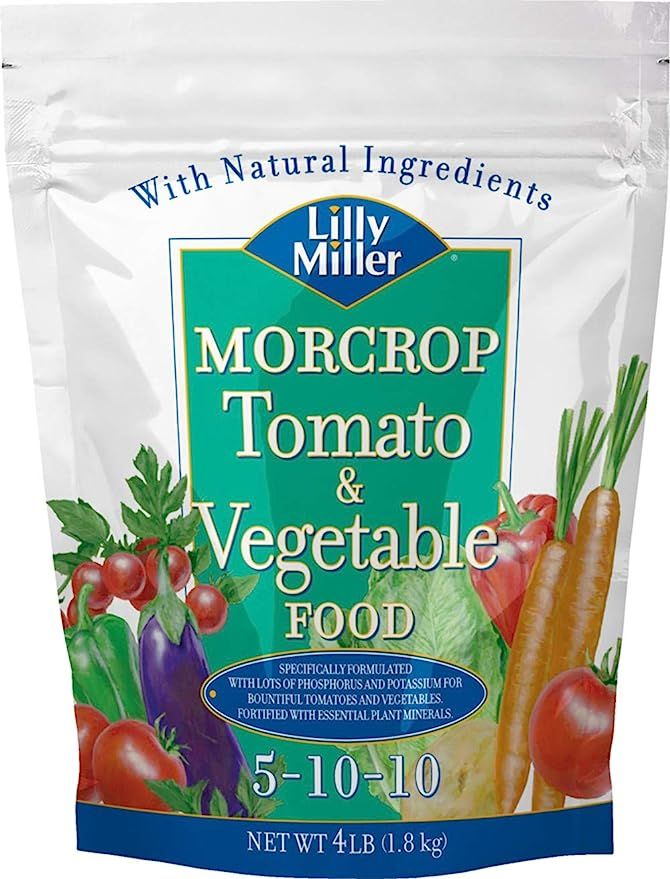
Lilly Miller Morcrop Tomato & Vegetable Food 5-10-10 4lb
Lilly Miller Morcrop Tomato & Vegetable Food offers a well-balanced and effective solution for nourishing your pumpkin plants.
- Good source of nitrogen, phosphorus, and potassium
- Easy to use
- Slow release
- Too much can cause pumpkins to split
- Natural but not organic
- Needs to be reapplied every four weeks
With sufficient nitrogen to maintain plant health without overstimulating foliage growth, this fertilizer strikes a good balance. It's noteworthy for its high phosphorus and potassium content, which are crucial for promoting fruit set and the development of sturdy pumpkin stems and rinds.
One of the advantages of this product is its slow-release nature, which means it requires less frequent application compared to liquid fertilizers. Lilly Miller Morcrop Tomato & Vegetable Food is user-friendly and has a low odor, making it a convenient choice for pumpkin cultivation. However, it's essential to be cautious about excessive application, as it can lead to pumpkin splitting or exploding. Following the recommended dosage is key to successful use. While it's not certified organic, this fertilizer is derived from natural sources, making it a suitable option for many gardeners.
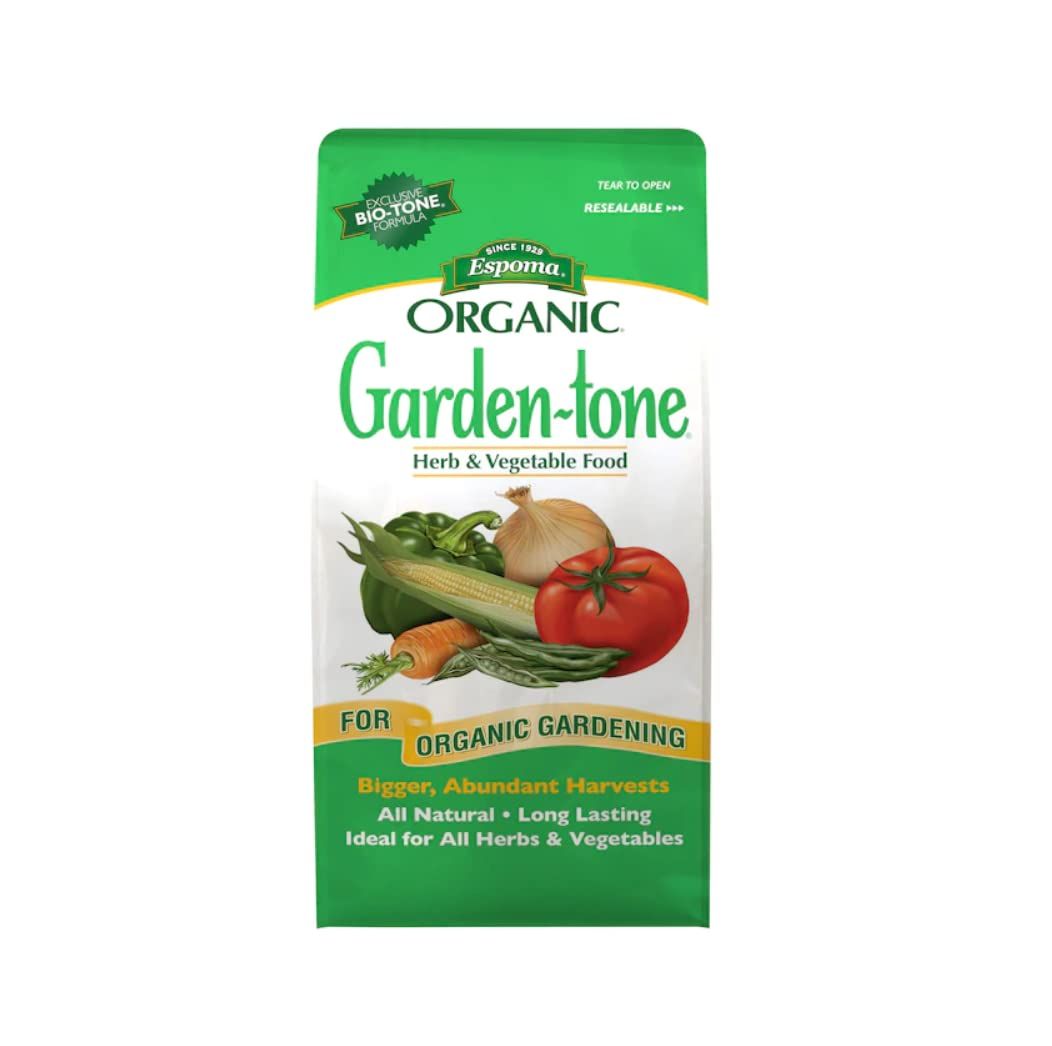
Espoma Organic Garden-Tone
Espoma Organic Garden-Tone is a versatile and comprehensive fertilizer choice for all stages of pumpkin growth, making it a convenient option for many gardeners.
- Inexpensive
- Good source of macro and micronutrients
- Contains nitrogen and phosphorus
- Strong smell
- Wear gloves when handling
- Needs to be applied every four weeks
This fertilizer is suitable for pumpkins and other vegetables, offering a well-balanced blend of nitrogen, phosphorus, and potassium. Additionally, it contains essential micronutrients and probiotics that contribute to soil health by nourishing soil microbes.
One of the standout features of Espoma Organic Garden-Tone is its slow-release nature, which means it requires less frequent application compared to liquid fertilizers. While it may have a strong odor, it remains a cost-effective choice for providing comprehensive nutrition to your pumpkins and other plants.
It's recommended to spread the fertilizer beside the pumpkin vines for effective use and ensure thorough watering to help nutrients reach the roots efficiently. This fertilizer's versatility and long-lasting effects make it a valuable addition to your pumpkin-growing regimen.
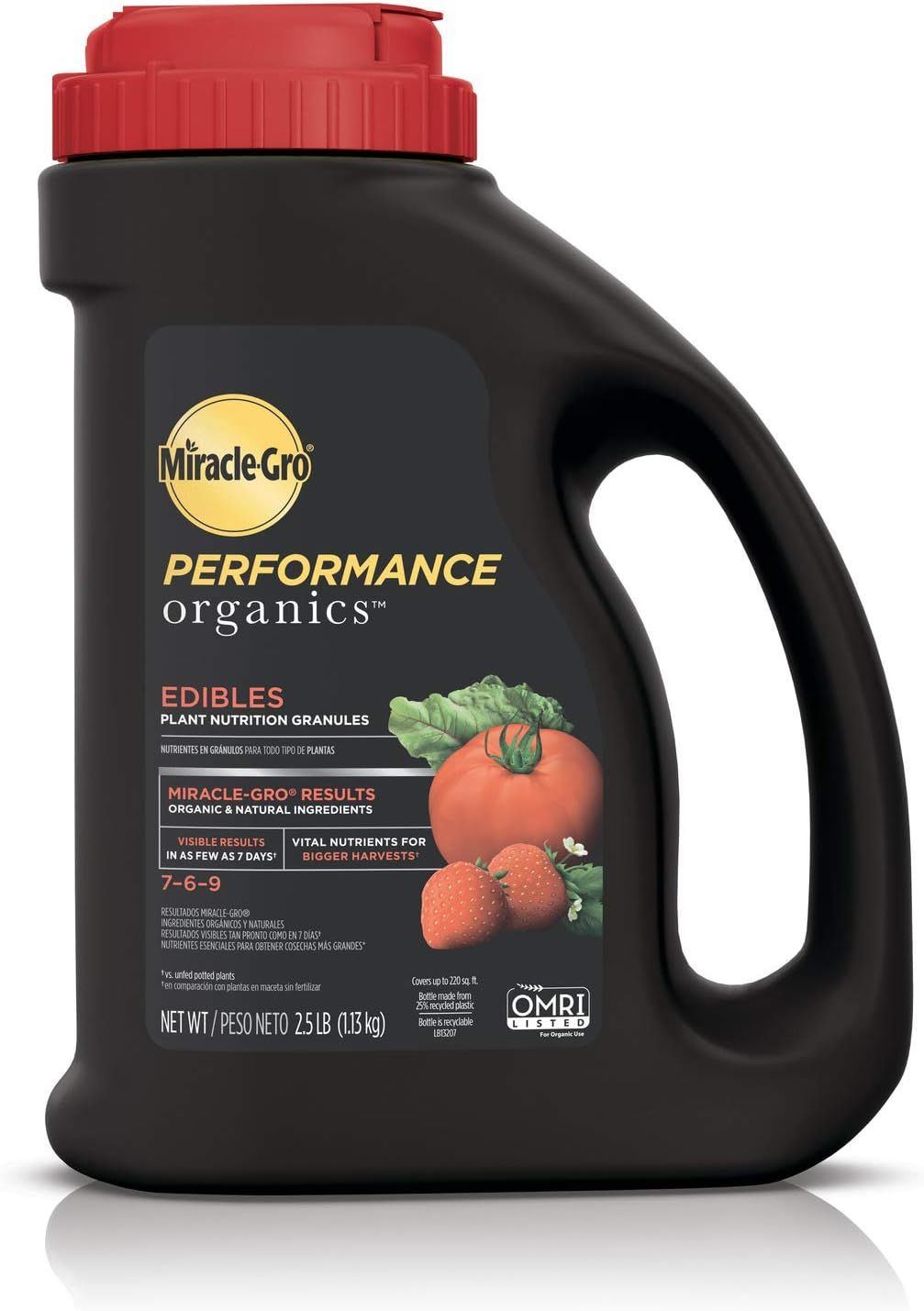
Miracle-Gro Performance Organics Edibles Plant Nutrition Granules
Miracle-Gro Performance Organics Edibles Plant Nutrition Granules are a budget-friendly choice for providing essential nutrients to your pumpkins.
- Inexpensive
- Good for edible pumpkins
- Organic
- Can crust on the soil
- Needs to be applied every four weeks
Miracle-Gro is a reputable company that has been transitioning from producing inorganic to organic products, making these granules a suitable option for those looking for affordable and effective plant nutrition.
One of the advantages of these granules is their ease of application and budget-friendly nature, which makes them particularly appealing for edible pumpkin cultivation. However, it's important to be aware that these granules can crust on the soil if not properly watered in. They require more water compared to liquid fertilizers, and it's essential to water them well to ensure optimal nutrient absorption by the roots. With proper application and watering, these granules can provide cost-effective nutrition for your pumpkin plants.
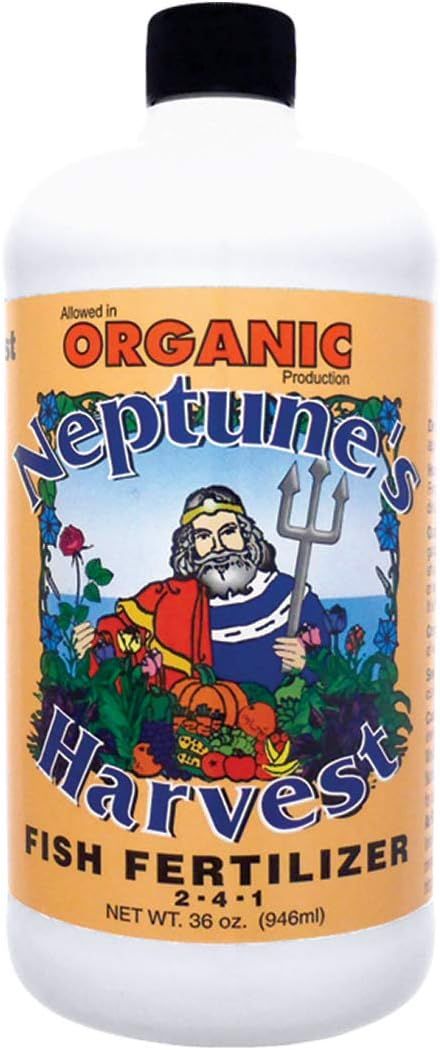
Neptune's Harvest Fish Fertilizer 2-4-1
When it comes time for your pumpkin vines to bloom, Neptune's Harvest Fish Fertilizer 2-4-1 is an excellent choice for liquid fertilizer.
- Water-soluble
- Certified Organic
- Cold-pressed, preserving heat-sensitive nutrients
- Needs to be applied every two weeks
- Can be pricey
- More dilute than some fish emulsions
This certified organic fertilizer is derived from North Atlantic fish, seaweed, and kelp, all cold-pressed to preserve their nutrient content. It offers a well-balanced blend of nitrogen, phosphorus, potassium, and essential micronutrients crucial for pumpkin flower production and fruit development.
Neptune's Harvest Fish Fertilizer is known for its fast-acting properties and ease of mixing. However, it's important to note that the solution may be more dilute compared to other fish emulsions, so you may need to use a slightly higher quantity to achieve the same results. Nevertheless, it remains reliable for nurturing healthy and productive pumpkin vines during the critical flowering stage.
Pumpkin Patch Paradise
Choosing the right fertilizer for your pumpkins is vital to their growth and productivity. From slow-release options to liquid fertilizers, there are numerous choices available to suit your needs.
Whether you prefer granular or liquid formulations or organic or synthetic options, the key is to provide your pumpkins with the nutrients they need at each stage of their growth. By selecting the best fertilizers and following proper application guidelines, you can ensure that your pumpkins thrive and reward you with a bountiful harvest.
Don't forget to share this article with your family and friends who need help growing the best pumpkin patch ever!

